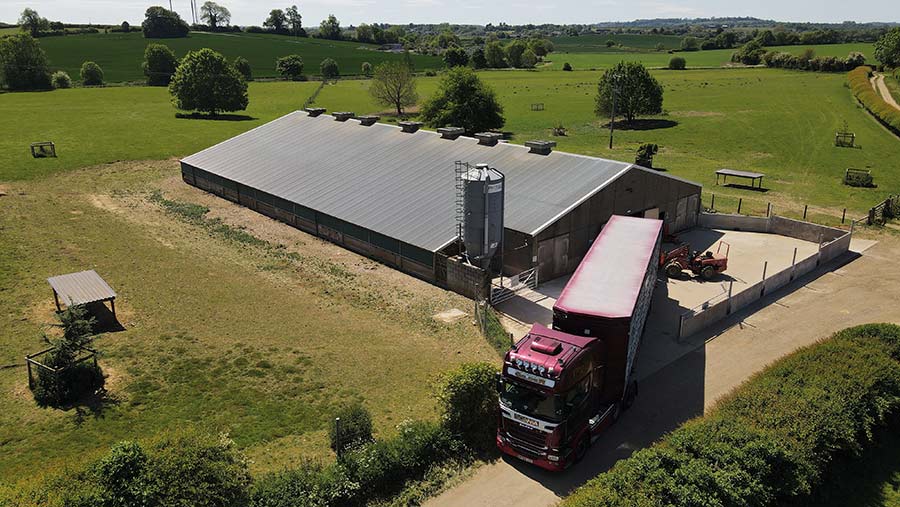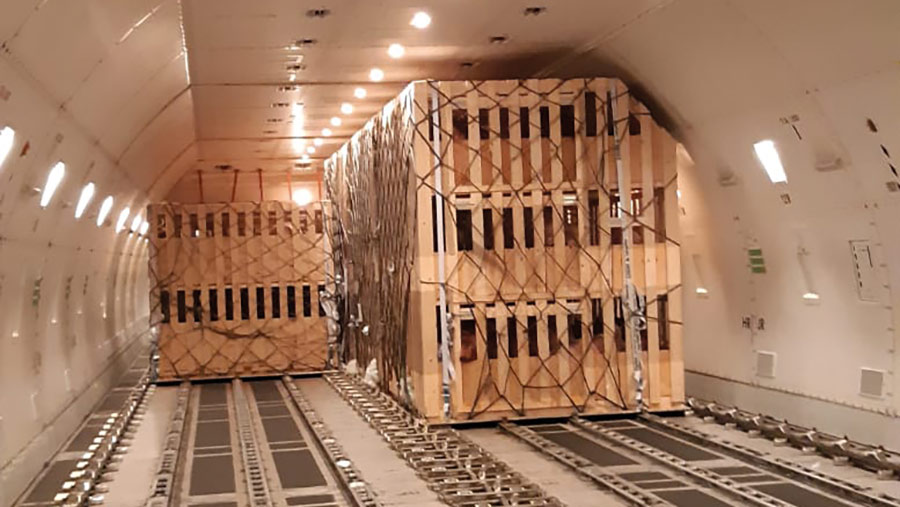How award-winning pig farmer tapped into China export market
 UK breeding stock exports are helping rebuild China's pig herd © Charlie Thompson
UK breeding stock exports are helping rebuild China's pig herd © Charlie Thompson Since 2018 China has lost half of its pigs to African swine fever, equating to about 30% of the global population.
Although the viral disease continues, the country is trying to rebuild its herd with the help of imports of top genetic breeding stock.
Up until last year, there had been very few breeding pigs exported from the UK to China in the past 15 years.
However, China has allowed imports of live animals from the UK as well as Canada, Denmark, France and the US.
See also: Farmers Weekly Awards 2020: Pig Farmer of the Year
With the pig genetics specialist Genesus having nucleus breeding herds in three out of the five approved countries, the company has been busy supplying stock to China over the past 18 months.
EU market problems
As a purebred herd supplying breeding stock to Genesus, Farmers Weekly’s Pig Farmer of the Year 2020, Charlie Thompson, of Bridge House Farm, has been able to tap into this market at a time when the doors to the European market have closed.
“It’s easier flying pigs to China than trying to get them into Europe,” he says.
“We have not been able to export any breeding pigs to the EU since 1 January because there are no border control posts for them at EU mainland ports. We don’t know when this will be allowed.”
Since July 2020, Mr Thompson has exported more than 1,500 breeding gilts and boars to China, with 1,000 more due to fly in April. More orders are expected this year.

Pigs are quarantined on the farm before their flight © Charlie Thompson
Becoming an approved herd
Although the process is currently easier than exporting to the EU, it isn’t for the faint-hearted.
In order for a herd to be approved, rigorous health tests are required. Pigs must undergo more tests before any animals board a plane.
The whole process, from the selection of the pigs to them arriving in China, takes more than 60 days.
Before Covid, an official Chinese government vet would be assigned to the UK to oversee the whole process from the selection of stock through to their arrival in China.
However, this is now being done remotely with all data, photos and videos sent to the Chinese official vets electronically.
Stage 1: Selection
With offspring from 900 breeding sows to sort through, picking out a cohort of pigs that are just a few weeks old is no mean feat.
To provide a range of breeding animals from a large genetic pool, only two to three gilts from each litter can be chosen.
All pigs have electronic identification tags and are performance-recorded, which helps Mr Thompson shortlist litters.
Selection takes place over 10 weeks post-weaning, with the youngest pigs selected immediately after weaning.
“We select pigs at a young age as we need them as light as possible for flying due to the cost and timescales of isolation and quarantine,” he explains.
From this shortlist, he then focuses on their looks (phenotypic selection). Attention is paid to legs, conformation, size, breed characteristics, teat numbers (14 or above) and the litter size they have been born into.

Pigs are kept with their pen mates for the flight to minimise stress © Charlie Thompson
They are then whittled down further by a geneticist at Genesus who looks at their breeding values for born alive, growth rates, litter size, and feed conversion ratio (genotypic selection).
Mr Thompson always selects 20% more pigs than are needed, to account for any losses or animals not making the grade along the way.
A small selection of high-performing boars is sent with each batch of gilts. They are carefully selected to match the chosen females.
Stage 2: Isolation room
Once Mr Thompson has made his selection the pigs must be isolated until health testing results are back (this can take up to 30 days).
They are housed in a separate room and when staff attend the pigs, they must foot dip and change into clean overalls.
When in isolation, every animal must be blood-sampled, TB-tested and their faeces swabbed. The samples are sent to various government laboratories to test for different diseases.
Mr Thompson has dedicated software allowing him to scan the pig’s ear tag and assign all tests to them digitally and instantly.
He says: “Last week, with Larkmead Vets, we blood, TB and faecal swab tested 1,164 animals over two days. We worked in teams of six. Technology has taken the stress out of things and increased the accuracy and speed at which we can do things.”
Stage 3: Quarantine
Animals must be quarantined in an Animal and Plant Health Agency (Apha) approved quarantine unit for 30 days before they fly. During this time, every pig must be resampled, with the addition of a nasal swab.
After deciding to get out of chickens last year, Mr Thompson stripped two of the old poultry sheds and converted them into two, 650-place quarantine units.
Stage 4: Flight
Once all the test results have been returned and the pigs are given the green light to fly, they must receive a final once-over and be identity checked by an official vet from Larkmead Vets within 24 hours of flying.
Mr Thompson works hard on the loading plan to make sure pigs remain with their pen mates to reduce mixing and stress.
They are loaded into crates that are either two or three layers high, depending on the size of the pigs. They are transported by an approved haulier to Stansted where they are loaded on to a freight aircraft. This is all organised by the team at Genesus.

The pigs are monitored during the flight and have access to feed and water © Charlie Thompson
The first flight that Genesus chartered for Mr Thompson’s pigs cost more than $1.2m (£1.08m) – double the normal price for flying pigs because of extra complications and costs caused by Covid.
On the plane, the pigs are cared for by a dedicated crew and have access to water as well as an inflight snack.
Mr Thompson adds: “The whole process is very efficient and from leaving the farm they are on their new farm in China within 24 hours. They are then quarantined for a further 45 days in another dedicated site before heading to their final destination.
“Selling breeding stock is hard work, but we are trying to add value to our product. The UK is going to have to do more of this. We have a good reputation for high-health pigs, and we should try to utilise this,” he advises.
Enter the 2021 Farmers Weekly Awards
The 2021 Farmers Weekly Pig Farmer of the Year Award is now open for entries.
Join Farmers Weekly in celebrating the farming industry and recognising the hard work of UK farmers and enter the Awards today.
Alternatively, nominate a deserving individual for an award.
For more information about the 2021 Farmers Weekly Awards, visit the official website.
